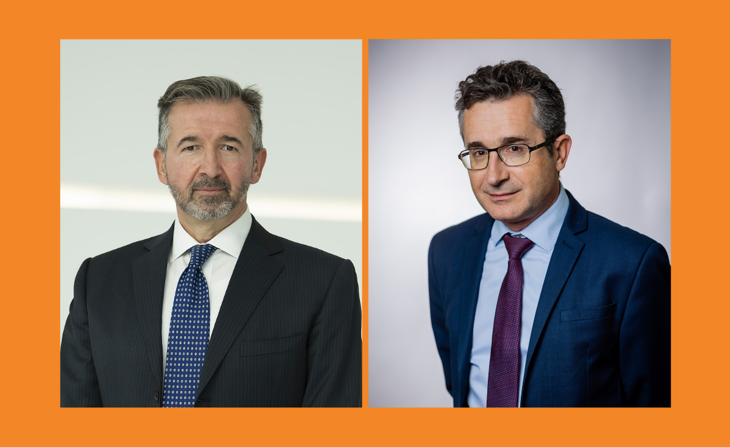
Vincent Chaigneau: The big question this year is can the market and economy digest so much tightening from central banks? Central banks are in panic mode given the high inflation numbers, and the market has fast adjusted to price steep tightening path, especially in the US.
"If we talk about the economy, there is a big shock in Europe from the war in Ukraine. We are looking at flat GDP in Q2 and Q3."
The market is pricing approximately ten 25bp hikes from the US Federal Reserve this year, and three hikes from the European Central Bank (ECB), and we have to ask if the market and the economy can absorb all this?
If we talk about the economy, there is a big shock in Europe from the war in Ukraine. We are looking at flat GDP in Q2 and Q3 2022. Then the economy may rebound again into the turn of the year, but a late-cycle global slowdown is likely by late 2023, as the US Federal Reserve tightening takes its toll on the economy
In all, looking 18 months ahead, you have a near term speed bump and then cyclical fatigue.
We are cautious on equities; we think bond yields can go higher, but they are going to slow sharply from here, given all the rate hikes that are priced already.
"On the equity side, there are many headwinds, it is a moment
where you want to be prudent."
Antonio Cavarero: We need to remember that we are investors through the cycle. This means that we can slow down or accelerate our path of investments according to market conditions and opportunities. For instance, we kept our duration stance cautious over the past 18 months. Now that rates are rising, there will be the point where we want to accelerate our pace of investments there
On the equity side, there are many headwinds, it is a moment where you want to be prudent and focus on those sectors that are better equipped to face high inflation and increasing rates. It is not disengagement for equities, not at all, but there must be an acknowledgement that the environment requires a cautious selection of sectors and factors.
Antonio: From our portfolio management perspective, we recognise the difficulties caused by this war. Europe is exposed to the slowdown coming from inflation and demand destruction and this is something that we will need weeks, if not months, to fully understand the extent of what is happening.
There is a geopolitical development that is part of a possible second Cold War facing us, and we need to look at this from a wider perspective. Supply chains will be reshaped; trade flows reshaped, and the reshaping economic equilibrium that has been defined in the last 20 years.
"On geopolitical risk, we have to integrate more into
our investment process."
Vincent: Without being too melodramatic, it looks a little bit like a Greek tragedy; this is one for the history books. When you look at what is happening to the markets, we will all recognise that it started with the Covid-19 crisis and the joint fiscal and monetary policies report that was used. Money printing was huge in Q4, the central banks produced new tools. There was a massive shock, which may have contributed to inflation, and on top of that, you had the war coming with soaring commodity prices across the board.
Then you have the energy transition that was pushing energy prices to the upside. All that combined has pushed inflation to levels that were unthinkable only a year or two ago and the central banks are a panicking a little bit at this point.
On top of geopolitical risk, we have to integrate more of these factors into our investment process, and as we shift to a new work order and the risk seems to come from different angles. This is the case for asset managers or insurance companies and it is also true for any other companies that think the geopolitical risks need to be included into the whole decision making process.
It is difficult because geopolitics is extremely hard to forecast, and we need to be humble. It is all about identifying where risks are for the companies or portfolios, and can we hedge them? Geopolitics is important, and some people say you can tackle issues with it in a similar manner to climate change, for example, but that is a matter of opinion.
"There is the famous Winston Churchill quote, “never let
a good crisis go to waste"."
In terms of our strategy, the rise in yields for many insurance companies is going to be a good thing. From a capital point of view, it is going to provide some relief. As the cycle matures, and you have those geopolitical risks, companies will consider whether to spend a little bit on the hedging strategies, but more generally, the market risks increase as the cycle matures, and the sharp monetary tightening is going to help the cycle mature more quickly. Hedging strategies are going to be important; the cost of hedging has increased, and volatility is high.
Equity volatility is not high and these two things have decoupled in a way that is quite unusual, and not sustainable.
Antonio: There is the famous Winston Churchill quote, “never let a good crisis go to waste,” and if I look at this from an investment perspective, this crisis can work as an accelerator to trends. Several trends also have an investment consequence, which is related to new technologies and many of them are linked to the energy transition.
The world needs to rebalance its energy sources. This will provide new investment opportunities not only in the energy space but also in the food, and agriculture space. We already offer clients products that are investing in new technologies in these spaces. From an investment perspective, there are new investment avenues that link to these transitions.